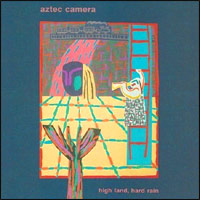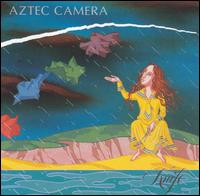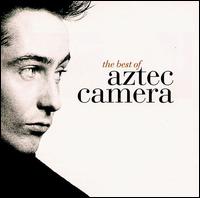|
Music Reviews
Alternative
Blues
Books
Christmas
Classic Rock
Country
Jazz
Lounge
Oldies
Power Pop
Punk & New Wave
Reggae
Rhythm & Blues
Seventies
Texas
Special Features
Randy's Rodeo
Sex Pistols
Motown
Halloween
Valentine's Day
Information
About Me
Feedback
Links
User's Guide
Support Me
Amazon
iTunes
Sheet Music Plus
|
Sock it to me, Santa! Visit my other website, www.hipchristmas.com Visit my other website, www.hipchristmas.com
 Roddy
Frame (who is Aztec
Camera in all but name) started out as a bold pioneer but became just another
earnest Scottish popster. By 1983, punk seemed poised to become the official
language
of the alternative
universe. That year, Aztec Camera's debut, High
Land, Hard Rain, cut a wide swath through the noisy competition, pointing
the way towards a brave new world of thinking pop - topical, aggressive, minimal,
yet sophisticated. Brandishing an acoustic guitar and and wearing his feelings
proudly on his sleeve, Roddy Frame and his ever-evolving supporting cast proved
that smart music needn't be all bluster and agitation. Roddy
Frame (who is Aztec
Camera in all but name) started out as a bold pioneer but became just another
earnest Scottish popster. By 1983, punk seemed poised to become the official
language
of the alternative
universe. That year, Aztec Camera's debut, High
Land, Hard Rain, cut a wide swath through the noisy competition, pointing
the way towards a brave new world of thinking pop - topical, aggressive, minimal,
yet sophisticated. Brandishing an acoustic guitar and and wearing his feelings
proudly on his sleeve, Roddy Frame and his ever-evolving supporting cast proved
that smart music needn't be all bluster and agitation.
Add to the mix Frame's fierce intellect and his intuitive understanding of soul
music, and High
Land, Hard Rain seemed to many of us as a harbinger of great change. In the
end, it was a brilliant moment in time and little more, because with the Mark
Knopfler-produced Knife (1985)
and the albums that followed, Frame moved Aztec Camera towards an over-produced,
middle-of-the-road sound that cut the legs out from under his incisive lyrics
and leftist politics.
Beginning as a less corrosive interpolation of Elvis Costello, Frame ended up
merely as a more nuanced version of Simply Red's soporific Mick Hucknall - or,
even worse, a less fey alternative to Culture Club's Boy George.
 Yet,
Frame remained capable of grand statements. Take "Just Like The USA" (from Knife),
which uses America's political and economic excesses as a personal metaphor.
Or "How Men Are" (from 1987's Love),
in which Frame employees a personal crisis as a canvas on which to paint a damning
feminist screed. Even more, Frame's earnest, impassioned tenor always cut to
the heart of the matter without regard to the musical clutter that increasingly
threatened to overwhelm it. His vocal prowess - consistent and deft, never merely
professional - is the silver lining of Aztec Camera's unfulfilled promise. Yet,
Frame remained capable of grand statements. Take "Just Like The USA" (from Knife),
which uses America's political and economic excesses as a personal metaphor.
Or "How Men Are" (from 1987's Love),
in which Frame employees a personal crisis as a canvas on which to paint a damning
feminist screed. Even more, Frame's earnest, impassioned tenor always cut to
the heart of the matter without regard to the musical clutter that increasingly
threatened to overwhelm it. His vocal prowess - consistent and deft, never merely
professional - is the silver lining of Aztec Camera's unfulfilled promise.
With the benefit of hindsight, Frame's music wasn't groundbreaking at all. In
fact, his group was a harbinger of adult alternative, the obnoxiously lukewarm
radio format that arose during the 1990's catering to aging, noise-addled punks.
In that context, Aztec Camera's soft touch appears not as a bold new direction
but as a weakening of resolve. And, Roddy Frame simply wasn't the revolutionary
we envisioned - he just made good pop records. The failure of vision, then, was
as much our's as his.
 Nevertheless,
taken on their own terms, all of Aztec Camera's records are agreeable, and portions
of them can be quite bracing. Certainly, I recommend the stellar High
Land, Hard Rain, and in retrospect Knife is
entirely credible - despite the fact that it baffled and infuriated fans upon release.
Delving deeper, the four remaining albums each present several stirring moments,
though Dreamland (1993)
and Frestonia (1995)
find Roddy Frame settling ever more comfortably into into the easy chair of middle-age.
(After Frestonia,
Frame dropped the pretense of the Aztec Camera moniker and began releasing records
under his
own name). Nevertheless,
taken on their own terms, all of Aztec Camera's records are agreeable, and portions
of them can be quite bracing. Certainly, I recommend the stellar High
Land, Hard Rain, and in retrospect Knife is
entirely credible - despite the fact that it baffled and infuriated fans upon release.
Delving deeper, the four remaining albums each present several stirring moments,
though Dreamland (1993)
and Frestonia (1995)
find Roddy Frame settling ever more comfortably into into the easy chair of middle-age.
(After Frestonia,
Frame dropped the pretense of the Aztec Camera moniker and began releasing records
under his
own name).
I also give a qualified recommendation to the imported Best
Of Aztec Camera (1998). Despite its lofty price, it's a better value than
collecting the entire Camera catalog. Unfortunately, it omits several key tracks
(e.g. "Just
Like The USA") and includes a few that are best forgotten (e.g. Frame's starchy,
contrived political rant, "Good Morning Britain," recorded with the Clash's
Mick Jones). A later collection, Deep
And Wide And Tall (2005) lowers the price and while failing to improve the
track selection - quite the opposite, in fact.
Be aware that the original editions of Aztec Camera's albums are rapidly
falling out-of-print. Of
particular
interest
to collectors,
then, is
an
ongoing
series
of 2-for-1 CD
reissues by American indie Wounded
Bird Records. These include a disc pairing the slick-but-soulful Love (1987)
with the stylistic melange of Stray (1990).
Much better is another CD joining Knife with Aztec
Camera, the 1985 EP featuring "Jump," Frame's delightful (if
unlikely) cover of the skronky Van Halen classic. [top of page]
 Selected Aztec
Camera Albums Selected Aztec
Camera Albums
[top of page]
 Essential Aztec
Camera Songs Essential Aztec
Camera Songs
- Back On Board (1983)
-
Birth Of The True (1984)
-
The Crying Scene (1990)
-
Down The Dip (1983)
-
How Men Are (1987)
-
Jump (1985)
-
Just Like The USA (1984)
-
Oblivious (1983)
-
Somewhere In My Heart (1987)
-
Walk Out To Winter (1983)
[top of page]
 Aztec
Camera On The Web Aztec
Camera On The Web
[top of page]
 Feedback Feedback
Your witty comments, impertinent questions, helpful suggestions, and angry denials
are altogether encouraged. Submit feedback via email;
submissions will be edited and posted at my discretion.
|
|